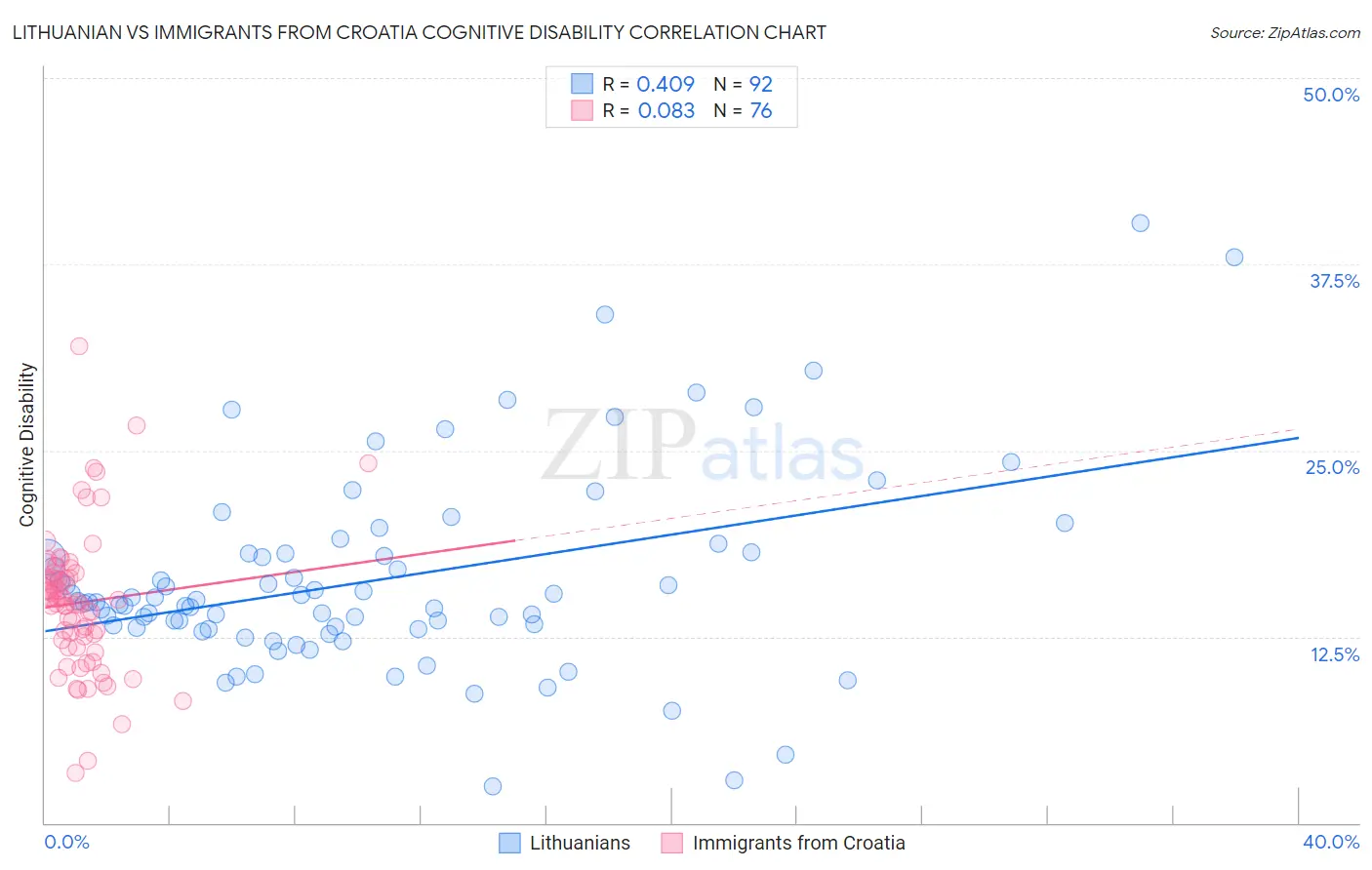Lithuanian vs Immigrants from Croatia Cognitive Disability
COMPARE
Lithuanian
Immigrants from Croatia
Cognitive Disability
Cognitive Disability Comparison
Lithuanians
Immigrants from Croatia
16.3%
COGNITIVE DISABILITY
100.0/ 100
METRIC RATING
13th/ 347
METRIC RANK
16.4%
COGNITIVE DISABILITY
99.9/ 100
METRIC RATING
26th/ 347
METRIC RANK
Lithuanian vs Immigrants from Croatia Cognitive Disability Correlation Chart
The statistical analysis conducted on geographies consisting of 421,943,876 people shows a moderate positive correlation between the proportion of Lithuanians and percentage of population with cognitive disability in the United States with a correlation coefficient (R) of 0.409 and weighted average of 16.3%. Similarly, the statistical analysis conducted on geographies consisting of 132,576,983 people shows a slight positive correlation between the proportion of Immigrants from Croatia and percentage of population with cognitive disability in the United States with a correlation coefficient (R) of 0.083 and weighted average of 16.4%, a difference of 0.79%.

Cognitive Disability Correlation Summary
| Measurement | Lithuanian | Immigrants from Croatia |
| Minimum | 2.5% | 3.4% |
| Maximum | 40.3% | 32.0% |
| Range | 37.8% | 28.6% |
| Mean | 16.3% | 14.8% |
| Median | 14.8% | 14.9% |
| Interquartile 25% (IQ1) | 13.1% | 12.0% |
| Interquartile 75% (IQ3) | 18.1% | 16.6% |
| Interquartile Range (IQR) | 5.0% | 4.6% |
| Standard Deviation (Sample) | 6.6% | 4.7% |
| Standard Deviation (Population) | 6.6% | 4.7% |
Demographics Similar to Lithuanians and Immigrants from Croatia by Cognitive Disability
In terms of cognitive disability, the demographic groups most similar to Lithuanians are Immigrants from Austria (16.3%, a difference of 0.060%), Maltese (16.2%, a difference of 0.090%), Immigrants from Greece (16.3%, a difference of 0.090%), Immigrants from Czechoslovakia (16.2%, a difference of 0.25%), and Immigrants from Scotland (16.2%, a difference of 0.34%). Similarly, the demographic groups most similar to Immigrants from Croatia are Immigrants from Pakistan (16.4%, a difference of 0.020%), Polish (16.4%, a difference of 0.020%), Luxembourger (16.4%, a difference of 0.030%), Filipino (16.4%, a difference of 0.050%), and Immigrants from Argentina (16.4%, a difference of 0.070%).
| Demographics | Rating | Rank | Cognitive Disability |
| Assyrians/Chaldeans/Syriacs | 100.0 /100 | #9 | Exceptional 16.2% |
| Immigrants | Scotland | 100.0 /100 | #10 | Exceptional 16.2% |
| Immigrants | Czechoslovakia | 100.0 /100 | #11 | Exceptional 16.2% |
| Maltese | 100.0 /100 | #12 | Exceptional 16.2% |
| Lithuanians | 100.0 /100 | #13 | Exceptional 16.3% |
| Immigrants | Austria | 100.0 /100 | #14 | Exceptional 16.3% |
| Immigrants | Greece | 100.0 /100 | #15 | Exceptional 16.3% |
| Eastern Europeans | 100.0 /100 | #16 | Exceptional 16.3% |
| Immigrants | North Macedonia | 100.0 /100 | #17 | Exceptional 16.3% |
| Immigrants | Northern Europe | 100.0 /100 | #18 | Exceptional 16.3% |
| Immigrants | Bolivia | 100.0 /100 | #19 | Exceptional 16.3% |
| Bulgarians | 100.0 /100 | #20 | Exceptional 16.3% |
| Immigrants | Cuba | 100.0 /100 | #21 | Exceptional 16.3% |
| Immigrants | South Central Asia | 99.9 /100 | #22 | Exceptional 16.4% |
| Croatians | 99.9 /100 | #23 | Exceptional 16.4% |
| Immigrants | Argentina | 99.9 /100 | #24 | Exceptional 16.4% |
| Luxembourgers | 99.9 /100 | #25 | Exceptional 16.4% |
| Immigrants | Croatia | 99.9 /100 | #26 | Exceptional 16.4% |
| Immigrants | Pakistan | 99.9 /100 | #27 | Exceptional 16.4% |
| Poles | 99.9 /100 | #28 | Exceptional 16.4% |
| Filipinos | 99.9 /100 | #29 | Exceptional 16.4% |